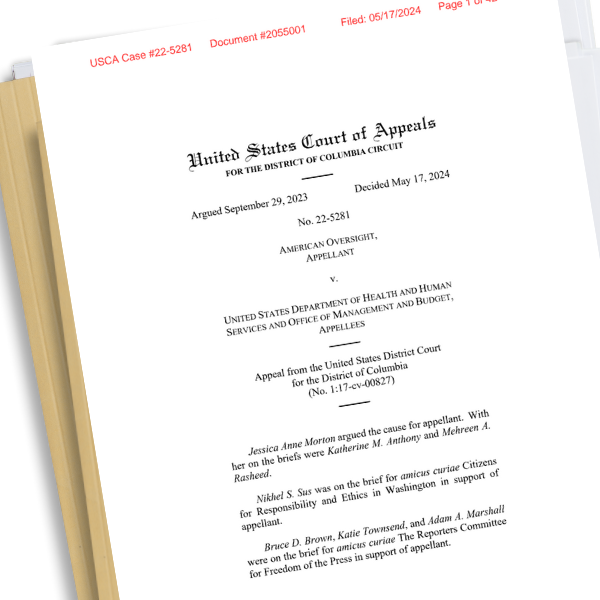
American Oversight to Appeal Judgment Allowing Government Agencies to Withhold Certain Communications with Congress
American Oversight filed notice that it plans to appeal an August judgment allowing government agencies to withhold certain communications with Congress by using a FOIA exemption typically reserved for agency employees.

On Tuesday, American Oversight filed notice with the U.S. District Court for the District of Columbia that it plans to appeal an August 2022 judgment allowing government agencies to withhold certain communications with Congress by using a Freedom of Information Act exemption typically reserved for agency employees.
The communications sought by American Oversight include messages exchanged between Trump administration officials in the Department of Health and Human Services (HHS) and Office of Management and Budget (OMB) and members of Congress or their staff in early 2017 regarding efforts to repeal or weaken the Affordable Care Act. After American Oversight sued HHS and OMB for the records in May 2017, the agencies released many records but withheld or applied heavy redactions to all substantive exchanges with Congress, arguing that the communications fell under a judge-made extension of the FOIA exemption protecting inter- or intra-agency deliberations known as the “consultant corollary.”
In May of this year, a federal judge ruled that the agencies could continue withholding the communications under the exemption, a decision that became final in August and that American Oversight now plans to appeal.
In a separate lawsuit brought by American Oversight for similar records, a federal judge in 2019 sided with American Oversight and rejected the administration’s argument. In that case, the agencies had also invoked the “consultant corollary,” which applies when outside consultants are acting “akin to an agency employee.” American Oversight argued that the corollary only extends to those consultants who are neutral parties not representing their own interests, and therefore cannot apply to members of Congress, who are unable to stand in the shoes of agency employees because they are advancing their own (or their constituents’) interests.


